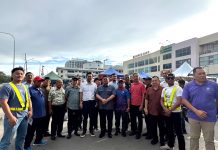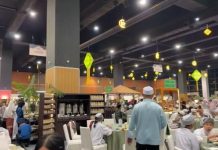KOTA KINABALU: The Federation of Chinese Associations Sabah (FCAS) has implored the government to allocate more funds for Sabah in Budget 2021.
Its President Tan Sri T.C Goh said this is necessary in view of the fact that Sabah is currently the Covid-19 worst-hit state in the country.
“We also hope the Federal government could allocate more funds to beef up Sabah’s public healthcare system, to build more medical facilities, to deploy more medical personnel to Sabah and to boost training programs for medical staff, especially those serving in the rural areas,” he added.
He especially proposed the Federal government to set up a medical college or international medical university in Sabah, to train and produce more medical personnel, so as to elevate the standard and quality of healthcare system in the state, in the long run.
Noting that since Budget 2021 is widely recognised as a “pandemic-fighting Budget”, at the same time to prepare for post-pandemic economic recovery, he said this made it even more crucial for Sabah to receive greater attention when it comes to allocation of funds under Budget 2021.
He said, feedback gathered by FCAS from various quarters indicated that a vast majority of Sabahans were rather disappointed with the Federal government’s allocation of RM5.1 billion infrastructure development fund for Sabah in Budget 2021, which is RM1 billion less than the RM5.2 billion allocation in this year’s budget.
In his comment on Budget 2021 issued today, Goh who is also the President of Federation of Chinese Associations Malaysia (Huazong) opined that instead of reducing development funding for Sabah next year, the government should increase funding for the state to better fight the pandemic.
He noted that under the 2021 Budget, Sabah was allocated RM5.1 billion for infrastructure development, apart from RM3.8 billion for the continuation of the Pan-Borneo Highway project and other packages of its construction.
Other goodies for Sabah include RM1,000 additional Special Grant for traders, which would also be extended to taxi drivers, e-hailing drivers, hired car operators and tour guides in the state to help cushion the dip in tourist arrivals.
They also include mobile bank services to be extended to Sabah to facilitate distribution of government assistance to the rural folk, RM41 million for the Native Customary Rights Programme in order to preserve native rights in Sabah, as well as an allocation for the distribution of essential goods.
The hill paddy subsidy will also see a RM40 million allocation for next year which would benefit nearly 10,000 planters in Sabah working on an estimated 7,000ha of hill paddy fields.
In addition, there is also a RM100 million for the regional investment authority, Sabah Economic Development and Investment Authority (Sedia).
Goh especially welcomed the continuation of the Pan-Borneo Highway project and other packages of its construction. He hoped the government could strive to expedite the completion of the project, so as to accelerate developments in Sabah and Sarawak.
While welcoming the extension of tax reliefs for economic development corridors in Sabah, he hoped the government could pay more attention to local businesses, and not just to focus on foreign investors, especially during this trying time of a pandemic.
“We hope that the federal government could pay greater attention and allocate more funds to better upgrade the infrastructures of Sabah and Sarawak, so as to better stimulate the economy of the two states, and to uplift the people’s standard of living,” he said.
Besides this, he also hoped the State government could in its ow






